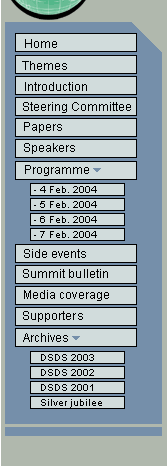

DSDS 2004
Partnerships for Sustainable Development: addressing the WEHAB agenda
Decision-makers from governments, corporates, non-governmental organizations; pioneering researchers and scientists; leading media representatives; and senior executives from bilaterals, multilaterals, and the diplomatic corps.
Water, energy, health, agriculture, and biodiversity—these are the areas ‘in which progress is possible with the resources and technologies at our disposal,’ said Mr Kofi Annan, Secretary-General of the United Nations, at Johannesburg, proposing special attention on these five key thematic areas forming the WEHAB framework. Ten days of intensive deliberations at the WSSD resulted in a significant outcome: partnerships for sustainable development involving governments, corporates, funding agencies, scientific and technology concerns, and civil society groups, aimed at implementing agendas built around the WEHAB themes. While an encouraging number of partnerships have come up and a considerable amount of funding has already been committed, many more are needed to meet the Millennium Development Goals of poverty reduction vis-à-vis protecting the earth’s environment for a sustainable future.
This requires unprecedented efforts on the part of all stakeholders; the role of science and technology becomes paramount. Besides, governments have to agree on many propositions, corporates have to show greater resolve, and civil society groups have to be more proactive. While DSDS 2003 dealt with the larger development priorities set at Johannesburg, DSDS 2004 (4–7 February 2004) – titled Partnerships for Sustainable Development: addressing the WEHAB agenda – will essentially focus on, analyse, and assess innovative partnerships in the post-WSSD scenario.
As every year, the 2004 edition of DSDS will feature contributions by enlightened leaders and thinkers of the world, representing a wide range of constituencies: government, business and industry, NGOs, scientific community, media, bilateral and multilateral community, and diplomatic corps. The speakers will be joined by over 400 delegates, adding value to the discussions and the final outcome of the summit.
With the inescapable perils posed by erratic changes in the earth’s climate, the imbalances in its biodiversity, and the alarming depletion of its natural resources, we have no other option but to operationalize the ‘sustainability’ of our development. It is imperative that our efforts – both at local and global levels – are informed by a clear mission and imbued with collective vision and resolve.
TERI (now The Energy and Resources Institute) has taken up a major responsibility of continuously providing knowledge and stimulating debate on various aspects of sustainable development. The DSDS (Delhi Sustainable Development Summit) – an annual international event organized by TERI since 2001 – is one such initiative that has emerged as the only forum on global sustainability issues, with an accentuated thrust on problems relating to the developing world. The DSDS brings the finest minds of the world together to deliberate upon specific themes and formulate strategies to set forth paradigms and approaches of sustainable development.
Now in its fourth year, the DSDS endeavours to find ways to effect the much-needed shift away from mindless human practices that add up to global warming, resource scarcity, and destabilization of traditional livelihood patterns; from economic policies that overlook environmental costs and, thereby, the future of the earth; from strategies that put political interests above the earth’s ecological well-being; and from profit-centric corporate philosophies.
Past summits
DSDS 2003
Beyond Johannesburg
Aimed to feed into the Johannesburg process, DSDS 2003 was aptly titled The Message from WSSD: translating resolve into action for a sustainable future. Held in the wake of the World Summit on Sustainable Development, which set priorities for action, DSDS 2003 essentially focused on ways to turn those priorities into concrete action. Encompassing a number of pertinent issues – water and sanitation, environment and health, education, corporate social responsibility, forestry and biodiversity, governance and media, climate change, and so on – DSDS 2003 added value to the WSSD process through many action-oriented suggestions. Reiterating that sustainable development issues are complex and must be tackled through integrated efforts of business organizations, governments, and civil society, it put forth the following recommendations.
Enhance efforts to further partnerships.
Encourage civil society participation in existing partnerships of NGOs, businesses, and governments.
Enhance and operationalize North–South partnerships.
Establish monitoring and measurement mechanisms to forecast and assess long-term impacts of various actions.
Conserve at all levels: local, regional, and global.
Mesh legal, institutional, economic, scientific, and technological resources.
Involve the various stakeholders.
Operate through long-term, non-compartmentalized approaches.
DSDS 2002
Looking at livelihoods
The second edition, DSDS 2002 (8–11 February 2002), focused on Ensuring sustainable livelihoods: challenge for governments, corporates, and civil society at Rio + 10. It sparked opportune dialogue and debate, and recharged the political momentum and enthusiasm of all involved in the Rio + 10 process, just ahead of the Johannesburg Summit. It provided concrete recommendations to feed into the Johannesburg process, advocating a holistic approach to natural resource management with an understanding of the dynamic interactions of the people – especially the poor – with the environment.
DSDS 2001
Tackling povertyThe series of international conferences – Global sustainable development in the 21st century: directions and innovations for change – in February 2000, organized to mark TERI’s silver jubilee, recommended the need for a common forum that could set global development agenda and would collectively monitor its progress. TERI endeavoured to fulfil the need and, the very next year, the DSDS series was initiated. Delegates from the world over at DSDS 2001 (7–9 February 2001) brainstormed on Poverty: the global challenge for governments, industry, scientists, and civil society. Deliberating over the fact that 2.8 billion people still live in crippling poverty, which constrains choices, exacerbates vulnerability, and perpetuates inequities with dangerous consequences, DSDS 2001 stressed that sustainable solutions should be swiftly devised and implemented by governments, corporates, civil society, and the scientific community, working in tandem.